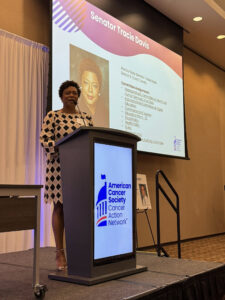Panel highlights how policies impact Florida’s health systems and patients as ACS CAN continues its nonpartisan mission to reduce the burden of cancer
By Valentina Palomino
(Source American Cancer Society Cancer Action Network (ACS CAN)

JACKSONVILLE, FL – Recently The American Cancer Society Cancer Action Network (ACS CAN) hosted Florida Cancer Breakfast: Breaking Down Barriers to Access at the Florida Blue Conference Center in Jacksonville on Monday. The program brought together health care leaders, researchers and advocates to discuss how public policy can improve access to care and spotlighted the urgent need for Congress to extend the health care tax credits that help people afford health insurance on the Marketplace.
“For cancer patients, these health care tax credits are a lifeline that enables access to timely, life-saving treatments,” said Susan Harbin, Senior Government Relations Director for ACS CAN Florida and recent Field Government Relations Professional of the Year.
“If we lose the tax credits, millions of people across the country will be unable to afford their insurance, adding to the pool of people who may have to rely on Medicaid or go without coverage,” Maureen G. Mann, MS, MBA, FACHE, Chair of the Board of Directors ACS CAN, Vice President of the Lynn Cancer Institute and Lynn Women’s Health & Wellness Institute. “Survivors have ongoing needs. People live with lifelong side effects from treatment, and if there are cuts to affordable insurance, many won’t get the services they depend on,” Mann said.
“We provided care last year for three and a half million encounters, including around $400 million in charity care and community benefit. Smaller hospitals without those resources won’t survive if funding changes,” Nurez Madhany, MPH Chief Operations Officer, True Health said when asked how health systems will be impacted by the expiration of these tax credits.
“I don’t think there’s much we can do when you’re already working with every patient. We just have to brace ourselves for the fact that cancer patients are 250% more likely to file for bankruptcy and that’s not just self-pay patients, that’s all cancer patients,” Katie Zacher, MBA Executive Director, Cancer Institute, Advent Health added.
Just last week, 700 volunteers from across the country gathered in Washington D.C. to urge lawmakers to find a pathway to continue the health care tax credits. “They shared personal stories with elected officials about how these credits make the difference between affording life-saving care or going without insurance. Without them, millions could lose coverage, driving up costs for families, hospitals and entire communities,” Mann said.
“One volunteer told senators she discovered her cancer might be back just days after enrolling with tax-credit insurance. Without those credits, she would have had no way to pay for scans and treatment,” Dr. Omar M. Rashid, MD, JD, FACS, FSSO, DABS, Surgical Oncology, Robotic & General Surgery Medicus and ACS CAN Board of Directors shared. Dr. Rashid was one of the 45 Florida advocates that gathered on Capitol Hill last week.